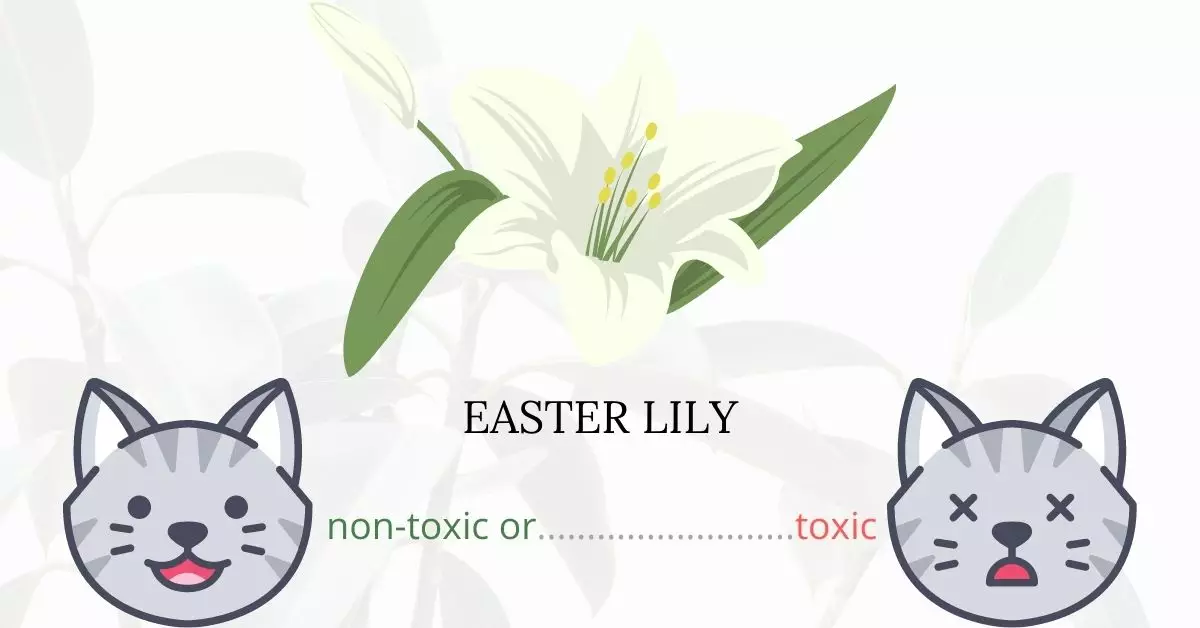Yes, Easter Lilies are toxic to cats.
Collaborating closely with a team of experienced DVMs (doctors of veterinary medicine), we have delved deep into the potential risks associated with various plants and their effects on our feline companions. Their insights, combined with rigorous research from high-authority websites such as ASPCA and PetMD, provide accurate and up-to-date information for pet owners.
While the specific toxin in Easter Lilies remains unidentified, it is known to be water-soluble. The leaf, pollen, stem, and flower are all poisonous parts of the plant. Should your cat ingest any portion of the Easter Lily, kidney damage can commence within 24-72 hours, making it imperative to seek veterinary attention promptly.
Clinical Signs of Easter Lily Poisoning in Cats

When cats come into contact with, smell, or ingest parts of the Easter lily, various clinical signs can develop, typically within 6-12 hours post-exposure. Understanding these symptoms and their underlying causes is crucial for early intervention:
- Vomiting: This is an immediate gastrointestinal response to the ingestion of the toxic elements in the Easter lily, as the body attempts to rid itself of the harmful substances.
- Inappetance: Due to gastrointestinal discomfort and potential nausea, cats may show a decreased interest in food.
- Lethargy: The toxins in the Easter lily can cause a reduction in a cat’s energy levels, leading to visible sluggishness and a lack of interest in normal activities.
- Dehydration: Vomiting and inappetance can result in decreased fluid intake and loss, culminating in dehydration.
If immediate medical attention is not sought, and the poisoning remains untreated, the severity of the symptoms can escalate, presenting more serious health risks:
- Acute kidney failure: Easter lily toxins target the kidneys, impairing their function, and potentially leading to complete kidney failure.
- Urination difficulties: As a result of kidney impairment, cats may struggle to urinate or produce very little urine.
- Excessive thirst: This is a compensatory mechanism, as the body tries to flush out the toxins and address the kidney dysfunction.
- Inflammation of the pancreas: The toxins may lead to pancreatitis, an inflammatory condition that can cause digestive complications.
- Disorientation: Neurological effects of the toxins can cause confusion and altered mental states in affected cats.
- Tremors: Another potential neurological symptom, tremors can arise from the impact of the toxins on the central nervous system.
- Seizures: In severe cases, the neurotoxic effects can culminate in full-blown seizures.
- Death: Without timely treatment, the cumulative effects of Easter lily poisoning can unfortunately lead to fatal outcomes.
Recognizing these signs early and seeking veterinary care is paramount to increase the chances of a full recovery.
First Aid and Treatment of Easter Lily Poisoning in Cats

In the early stages of toxicity, decontamination measures such as inducing vomiting and administering drugs like activated charcoal to bind the poison in the stomach and intestines are critical, while aggressive intravenous fluid therapy, kidney function monitoring tests, and supportive care can significantly improve the survival rate. For the best prognosis for your cat, IV fluids should be started within 18 hours.
Recovery from Easter Lily Poisoning in Cats

If your cat was provided speedy veterinary intervention, he or she will recuperate well. For severe cases, your cat might need close monitoring so he or she might stay in the veterinarian’s care for a couple of days until his condition stabilizes.
After treatment, discuss your cat’s post-treatment care with the vet and ensure to follow his advice. Give your cat a warm and comfortable space to rest inside your home. Ample fluids should be also given to your cat to continue clearing toxins from his or her stomach.
Prevention of Easter Lily Poisoning in Cats
Avoid bringing Easter lilies inside your household. If you are growing Easter lilies, it is better to remove them as soon as you are made aware of their toxicity to your feline companions. Limiting your cat’s access outdoors will also minimize the risk of exposure to lilies and other poisonous plants that grow in your neighborhood.
If you love plants but have cats at home, check out these lists:





